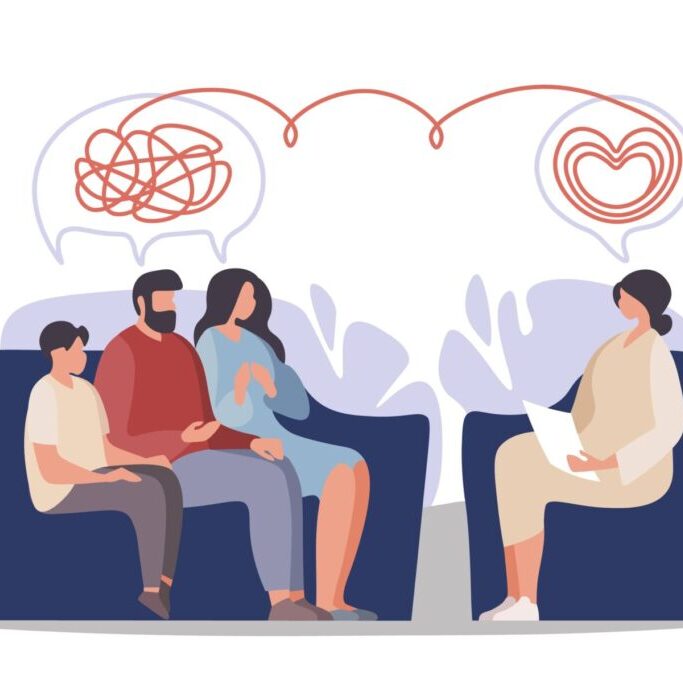Embracing Neurodiversity with Internal Family Systems Therapy

Understanding Neurodiversity
Neurodiversity is a term that acknowledges and celebrates the natural variations in the human brain and nervous system. It encompasses a range of cognitive and neurological differences, including conditions such as autism, ADHD, dyslexia, and more.
Rather than viewing these differences as deficits or disorders to be fixed, the concept of neurodiversity frames them as variations of human experience, each with its own set of strengths and challenges.
This perspective shifts the focus from trying to “normalize” neurodivergent individuals to understanding and accommodating their unique ways of processing information, experiencing the world, and interacting with others.
Around Chicago, efforts to understand and support neurodivergent people are increasing! Choose Chicago recently published an article about accessing much of what Chicago has to offer for families with neurodiversity. They highlight accommodations made at Chicago’s United Center, the Shedd Aquarium and even adaptive climbing at Brooklyn Boulder’s in West Loop Chicago.
Neurodiversity, Mental Health, and Therapy
Neurodivergent people face mental health challenges like anyone else, but they often encounter unique barriers. For instance, heightened sensitivity to sensory input or social interactions can lead to overwhelming stress or anxiety.
Executive functioning challenges can make it difficult to keep up with daily responsibilities, leading to isolation and low self-esteem. Therapeutic support is a common need for neurodivergent people given these heightened stressors.
However, traditional therapy approaches, which often rely on verbal communication and rigid structures, can be particularly challenging for those who process information differently. This mismatch can result in misunderstandings and a lack of engagement, as conventional therapies may focus more on perceived deficits than on leveraging individual strengths.
Emotional expression may also differ, further complicating therapeutic interactions. These differences highlight the need for neurodiversity therapy approaches that are flexible, inclusive, and tailored to the diverse cognitive and emotional landscapes of people who are neurodivergent.
IFS Therapy: A Neurodiversity Affirming Approach
Internal Family Systems (IFS) therapy, developed by Richard Schwartz, offers a unique and holistic approach to mental health that resonates deeply with the needs of neurodivergent people. At its core, IFS therapy is built on the understanding that each person has a core self and various “parts” that make up their internal experience.
IFS and Neurodiversity in Action: Working with Parts
In Internal Family Systems, parts are seen as ‘sub-personalities,’ each with its own distinct traits, emotions, and beliefs. These parts often operate independently, driven by their own motives, which can lead to inner turmoil and emotional struggles. A key principle of IFS is that there are no inherently bad parts.
However, when these parts dominate the system, they can become stuck in extreme roles. While their behavior might seem problematic, their intentions are always positive, though this can be difficult to recognize at times.
For neurodivergent people, this understanding of parts can be particularly relevant. For instance, a neurodivergent person might have an inner critic that feels burdensome, constantly urging them to do better or pointing out flaws. This inner critic may have developed as a defense mechanism, especially in environments where they felt different or misunderstood.
The part operates under the belief that it’s better to receive criticism from within than from an external source, particularly when external environments have not been accommodating or understanding.
IFS therapy is a well-suited approach to neurodiversity therapy because it not only helps in identifying and working with these parts but also in reconnecting with the core self, allowing for a more compassionate and integrated approach to change.
What makes IFS Therapy a Neurodiversity-Affirming Approach?
Internal Family Systems (IFS) therapy offers a tailored approach that aligns well with the unique needs of neurodivergent individuals by addressing their cognitive, emotional, and behavioral experiences in a compassionate and integrative manner. Here’s a closer look at how IFS therapy works well as a neurodivergent therapy approach:
1. Emphasis on Internal Self-Compassion
Neurodivergent people often face challenges related to self-acceptance due to societal pressures and internalized stigma. IFS therapy fosters a deep sense of self-compassion by helping clients recognize and embrace all parts of themselves, including those they may view as problematic or less desirable.
The core principle of IFS—that every part of the self has positive intent, even if its methods are maladaptive—resonates strongly with neurodivergent people who may struggle with self-criticism or feelings of inadequacy. By encouraging a compassionate and non-judgmental view of their internal experiences, IFS therapy promotes self-acceptance and healing.
2. Recognition of Diverse Cognitive and Emotional Processes
Neurodivergent people often experience cognitive processes that differ from neurotypical norms, such as unique ways of processing information, problem-solving, or experiencing sensory input.
As needed for neurodiversity therapy, IFS therapy is flexible in accommodating these diverse cognitive styles by allowing clients to explore their internal parts in ways that make sense to them. Neurodivergent people may also experience intense or atypical emotional responses, which can sometimes be misunderstood or invalidated by others.
IFS therapy provides a structured yet flexible framework for understanding and working through these emotions. By engaging with different internal parts that hold various emotional experiences, clients can gain insight into their emotional patterns and develop more adaptive coping strategies. This process helps in managing overwhelming emotions and reducing the emotional burden often associated with neurodivergence.
3. Strength-Based Focus
Internal Family Systems Therapy emphasizes the positive intent behind each part of the self and encourages clients to recognize and harness their strengths.
For neurodivergent people, this means that therapy can focus on identifying and building upon their unique capabilities, rather than solely addressing challenges. This strength-based approach can enhance self-esteem and foster a more empowering therapeutic experience.
4. Support for Navigating Social Interactions
Social interactions can be particularly challenging for neurodivergent people due to differences in social communication, sensory sensitivities, or social anxiety. IFS therapy addresses these challenges by working with internal parts that influence social behavior and perception.
For example, a client on the autism spectrum might have a part that is anxious about social interactions. IFS therapy helps them understand and address this anxiety, improving their social skills and confidence in navigating social situations.
5. Flexible Communication
IFS therapy is an excellent approach to neurodiversity therapy because it offers a flexible communication style that can adapt to the client’s needs. The therapy focuses on exploring different parts in a compassionate and non-judgmental way.
This approach allows neurodivergent people to express themselves through various modalities, whether verbal, written, or experiential. The flexibility of IFS therapy helps bridge communication gaps and facilitates a deeper understanding between the therapist and the client.
6. Adaptable Therapeutic Structure
One of the strengths of Internal Family Systems Therapy is its adaptability. Rather than adhering to a rigid therapeutic structure, IFS therapy is centered around the client’s internal experience and needs.
This means that neurodiversity therapy can be customized to fit the client’s unique cognitive and emotional landscape. The focus on exploring and integrating different parts of the self allows for a more personalized and relevant therapeutic experience.
7. Promoting Self-Leadership and Empowerment
A central goal of IFS therapy is to help clients access their core self, which is characterized by qualities such as curiosity, compassion, and confidence. For neurodivergent people, accessing this self can be particularly empowering, as it helps them lead their own healing process and make informed decisions about their lives. By fostering self-leadership, Internal Family Systems Therapy supports neurodivergent clients in developing greater self-efficacy and resilience.
IFS therapy aligns well with the needs of neurodivergent individuals by providing a compassionate, flexible, and individualized approach to therapy. Its emphasis on self-compassion, recognition of diverse cognitive processes, integration of emotional experiences, and support for social interactions make it a valuable tool for addressing the unique challenges and strengths of neurodivergent people. By leveraging these aspects of IFS therapy, neurodivergent individuals can achieve greater self-acceptance, emotional regulation, and overall well-being.
At Tandem Psychology, we understand the unique ways your mind works, and we’re here to help you harness those strengths. Through IFS therapy, you can explore and connect with all parts of yourself in a safe, supportive environment. Reach out today to begin your journey towards greater self-understanding and balance.
This blog is made for informational and educational purposes only. It is not medical advice. The information in this blog is not intended to (1) replace a one-on-one relationship with a qualified licensed health care provider, (2) create or establish a provider-patient relationship, or (3) create a duty for us to follow up with you.



